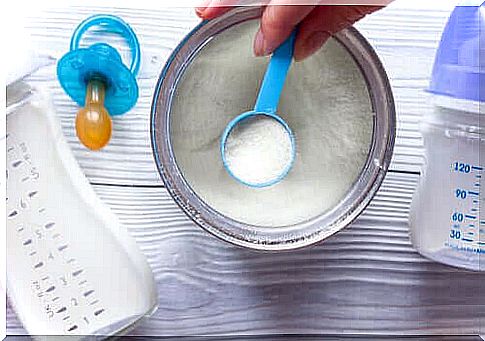The Right Milk For Toddlers After The First Year

Parents need to know how to choose the right milk for toddlers after the age of one. This is because the wrong choice of milk increases the risk of the little ones developing diseases, especially those of a metabolic and autoimmune nature.
Breast milk is best for babies. However, after rounding off their first birthday, their energy needs are greater. Therefore, breast milk may no longer be the only source of nutrition. With that in mind, parents need to know how to choose quality products that meet toddlers’ nutritional needs.
Which milk is best? What should you look for when choosing the right milk for babies over one year?
In this article we will tell you everything you need to know.
The right milk for toddlers over a year: Added sugar
The problem with many types of milk for toddlers is that they contain added sugar. Sugar is able to worsen the metabolic health of young children, increasing their risk of developing diseases as children or adults.
A study conducted by the European Pediatric Society concerned the reduction of simple sugar intake in children. According to this study, this measure helps prevent metabolic diseases such as diabetes.
Failure to pay attention to the amount of added sugar in milk can lead to negative consequences for children’s health. In addition, the use of these types of products is associated with changes in a person’s lipid profile.

When it comes to choosing the right milk for babies, it is important to make sure it is low in sugar.
The importance of omega-3 in milk for toddlers
You have probably heard about the benefits of including omega-3 – a fatty acid, which is anti-inflammatory by nature – in your diet. Intake of omega-3 on a regular basis helps, among other things, to reduce the risk of cardiovascular disease. This was demonstrated in a study published in the journal Pharmacology & Therapeutics.
In addition , these lipids are especially important in a child’s development. Frequent exposure to these nutrients in the early stages is able to reduce the incidence of autoimmune processes.
In terms of that, a study that took place in 2017 managed to relate a regular intake of omega-3 fatty acids in the first years of life with a lower risk of developing asthma.
It is therefore important to consider this when choosing the right milk for toddlers who are over a year old. In other words , one must ensure that the product one chooses contains these fatty acids in its composition.
Milk with vitamin D.
Vitamin D deficiency is a common problem among the general population. A study that included 97 pregnant women and 90 babies concluded that the levels of this micronutrient tended to be below the recommended levels.
A limited intake of vitamin D can affect a person’s bones in adolescence. It can thus increase a person’s risk of developing osteoporosis. This condition is common in menopausal women, and represents a risk to health and well-being.
In addition, low levels of this vitamin are associated with deficiencies in muscle strength and an increased risk of developing complex diseases.
Vitamin D is a nutrient that is difficult to get alone through the diet. The best way to guarantee the absorption of it is through a healthy exposure to sunlight. In order to minimize the risk of vitamin D deficiency , one should choose milk that contains significant amounts of this micronutrient.

As far as possible, the right milk for toddlers over the age of one should be enriched with vitamin D.
Choosing the right milk for toddlers over the age of one is not an easy task
As you can see, there are three primary parameters that you should keep in mind when choosing the right milk for your baby. Of course, there are other aspects that you can also consider. For example, it includes trust in the manufacturer, the presence of additives, etc.
You need to look at the nutrition label to be able to choose the right one. Failure to pay attention to this information may lead to the selection of a poor quality product. Or a milk that contains a large amount of simple sugar.
Remember that babies and children are still developing. If they eat large amounts of harmful substances, it can thus trigger the likelihood of suffering from complex diseases as adults. For this reason , parents will need to take care of their baby’s nutrition from the day they are born.









